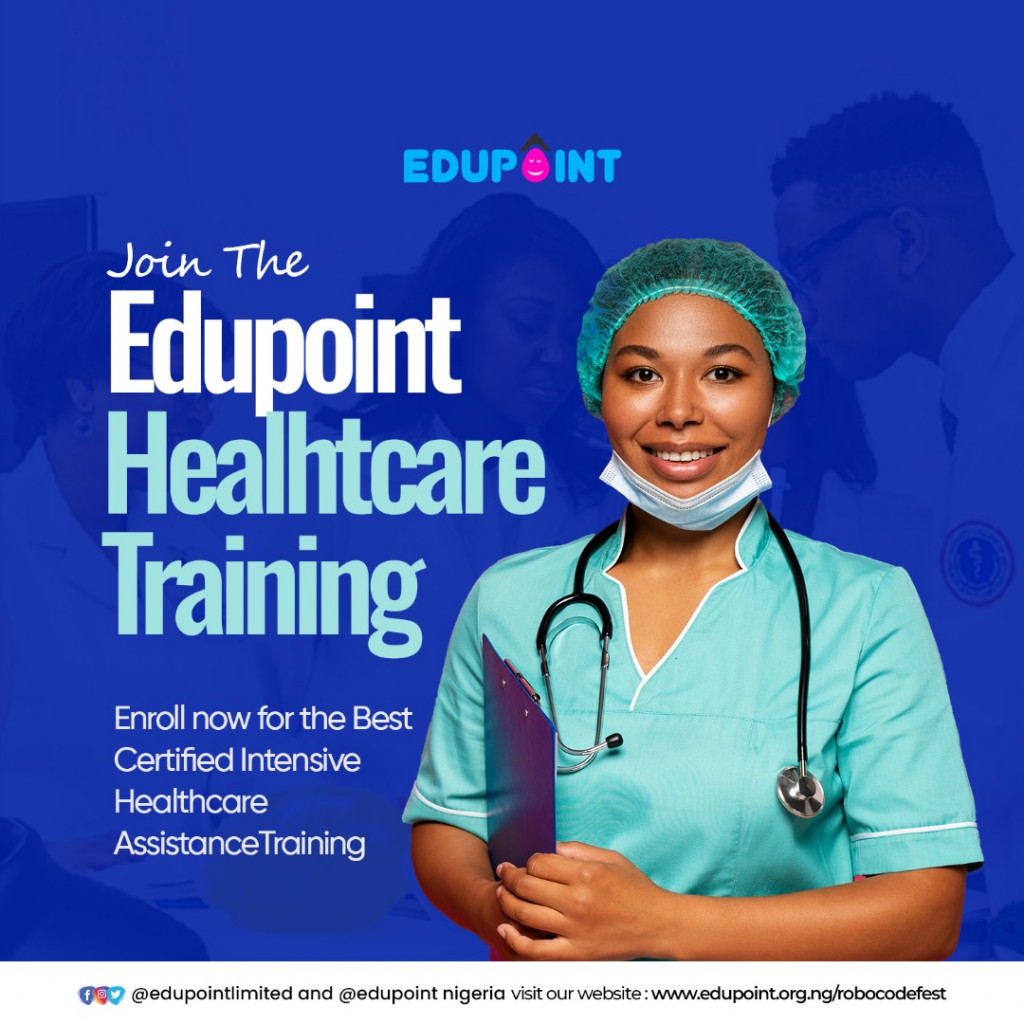Healthcare Assistant Certification Training for National & International Caregivers
Our Healthcare Assistant Certification Training is provided by experienced industry experts and designed to equip care professionals with the complete training and hands- on practical knowledge that qualifies you to pursue care opportunities in Nigeria and overseas like Canada, Dubai, South Africa, Australia, New Zealand, the United Kingdom, the United States, Ghana and the UAE.

Duration
8 weeks, thrice weekly

Class Length
3 hours

Class Size
20 Students

Location
Anthony, Online
About this course

Our Healthcare Assistant Course offers comprehensive training for individuals looking to pursue a career in caregiving. This program covers the essential roles of caregivers including legal and ethical considerations. You’ll learn about techniques for interacting with individuals with disabilities, as well as stress management, body mechanics, and organisational skills.
The course emphasizes the importance of observing, reporting, and documenting in caregiving, while also highlighting cultural awareness and competency. You’ll gain a thorough understanding of various ailments and illnesses commonly encountered in the field like Alzheimer’s and Dementia.
Our program stands out by providing practical, hands-on training. You’ll have access to well-equipped practical classrooms featuring articulated mannequins and medical gear. Additionally, you will participate in a practicum clinical internship period, interacting with real patients in a designated facility or hospital. This experiential learning ensures that you develop the proficiency and confidence necessary for the job.
Upon completion, you’ll be prepared to work as a Health Care Professional in various healthcare settings including private and publicly-funded facilities, hospitals, extended care, assisted living, rehabilitation facilities, and group homes under the supervision of registered nurses or licensed practical nurses.

Course Features
- 4 weeks of Theory and Hands-on Practical Sessions
- 2-3 weeks of Clinical Internship + Reference Letter
- Complete Care Certificate Standards Training Certificate of Completion
- UK CPD-Accredited Care Certificate (Optional)
- Link to Job Sites for Caregivers
- Global Standard HCA Curriculum Vitae (CV)
- End of Training Examination
You we'all learn
Introduction: This introductory lesson examines the full spectrum of career opportunities in the Caregiving Industry including Nursing Assistants, Healthcare Assistants, Care Support Associates, Support Worker etc., as well as a review of the core Care Standards and Principles.
Ethical and Legal Conduct for Healthcare Professionals: This comprehensive lesson examines the ethical and legal issues and standards for healthcare professions as outlined in regulatory and professional guidelines (e.g. CQC, NHS). We’ll examine Patient’s Bill of Rights, Empathy and Kindness in duty of care and Analyse measures to prevent or control workplace violence. standards for workers’ rights, Standards of Harassment, Labour, and Employment laws
Standard Precautions and Infection Control Measures: Infectious Disease Control process. Examine the Center for Disease Control (CDC) and Occupational Safety and Health Administration (OSHA) guidelines and Standard Precautions. Explain Isolation Process, Hygiene and Demonstrate the use of Personal Protective Equipment (PPE)
Principles for Risk Management, Fall Prevention & Ambulation: Examine effects of prolonged Restricted Physical Activity (e.g. Muscle Atrophy, Arterial Restriction etc.). We’ll demonstrate Techniques for Positioning, Turning, Ambulating & Transferring Residents (e.g., Side Lying, Trendelenberg, Lithotomy, Crutches, Cane, Wheelchair, Mechanical Lifts, Gait belt etc.). Identify the purpose of continuous passive motion (CPM) devices
Analysing Common Body Conditions, Disorders and Care: We’ll Identify the Function, Structure, Common Health Problems and Age-related Changes of the Integumentary System (Decubitus Ulcers, Shingles etc.), Muscoloskeletal System (Arthritis, Osteoporosis, Fractures etc.), Nervous Systems (Parkinson’s Disease, Dementia/Alzheimer’s, Multiple sclerosis etc.), Sensory System (Cataracts, Glaucoma, Neuropathy etc.) and Circulary System (Angina, Coronary Disease, Hypertension etc.)
We’ll also examine Common Disorders related to the Respiratory, Gastrointestinal, Urinary, Endocrine and Reproductive Systems.
Providing Basic Emergency Care: Recognising and Reporting Emergency Situations (e.g Asphyxia, Stroke/TIA, Anaphylaxis, Seizure, Hemorrahage etc.). Demonstrate Basic Life Support (CPR) at Minimum Accepted Standard of Practice and Perform Standard First Aid.
Communicating and Reporting Medical Information: Using the right terminology to Interpret and Communicate Information, Data and Observations. Communicating Effectively with Residents. Using specific vocabulary, procedures, abbreviations, and word elements for defined work areas
Measuring and Recording Vital Signs: In this lesson, we’ll analyze the purpose, influencing factors and procedures for measuring and recording temperature, pulse rate, respirations, blood pressure, height and weight, oxygen saturation etc.
Demonstrating Personal Care with Consideration to Cultural Preferences: In this lesson, we’ll examine procedures for bathing residents/patients, provide skin care and report skin problems, perineal care, dressing and undressing etc. We’ll also examine the use of and care of prosthetic and orthotic devices.
Maintaining Safe and Clean Environment for Residents: Explain risk management protocols in the healthcare environment, how to apply emergency procedures and comply with hazardous labelling requirements. Handling and disposing of contaminated and hazardous items according to standards and procedures. We’ll demonstrate how to provide care within scope of practice, as well as the proper and safe use of oxygen delivery systems.
Nutrition, Hydration, Exercise & Food Services: Identifying alternative feeding methods and optimal nutritional needs for residents. Examine therapeutic diets, using feeding devices. Measure and record nutritional data, including meal percentage, intake, and output. We’ll examine dietary concerns associated with age-related problems (e.g., denture problems, reduced sense of taste), situational factors (e.g., depression and dysphagia), and aspects of nursing assistant care (e.g. socialisation and comfort foods). Identify personal, cultural, religious, and medical conditions leading to variations in the diet.
Care for Residents with Drains/Tubes: Determine purpose and procedure for positioning and caring for resident/patient receiving tube feeding, gravity and sump drains. Examine complications with improper positioning and surgical gravity. Measure and record intake and output
Care for Residents Receiving Heat and Cold Treatments: Determine purpose and procedure for applying heat therapy (e.g., compress, soak heat pack, KPad, sitz bath) and cold therapy (e.g., cooling blanket, cold compress, ice bag). Follow policy and protocol for appropriate temperature range for heat and cold treatments.
Assisting with Admission, Transfer and Discharge: Explain the procedure for admitting, transferring and discharging a resident/patient. Maintain safekeeping of resident/patient’s belongings and personal possessions according to facility policy.
Assisting with Diagnostic Testing and Examinations: Determine purpose and procedure for collection, labelling, and sending specimen for analysis according to protocol (e.g., sputum, stool, urine, blood) and diagnostic testing (e.g., culture and sensitivity, clean catch, sterile, 24-hour).
Identifying Mental Health and Social Service Needs in Residents: Explain and apply the Patient’s Bill of Rights (e.g. right for independence and personal choices). Facilitate family/significant others as a source and resource of social and emotional support, and facilitate planned recreational activities that encourage social relationships in achieving optimal wellness.
Care for Residents from Special Populations and Those with Special Needs: This lesson will examine the special needs and developmental tasks of patients across their life span. Determine the purpose and techniques for addressing needs and behaviours of individuals with dementia, Alzheimer’s, and other cognitive or sensory deficits (e.g., cognitive impairments, anger, depression, unresponsiveness). Describe special needs of residents with a mental health diagnosis.
Care for Dying Residents and Their Families: Describe the stages of grieving, death and dying process. Explain the role of hospice in end- of-life care. Assist with care for the dying resident/patient and support for the family considering physical needs, spiritual, and cultural beliefs. Determine purpose and procedure for post mortem care (e.g., positioning, respect, dress, organ donation)
Course Examination: End of Training Assessment
Included with your lessons
A+
Clinical Internship
2-3 weeks of clinical internship in a care home or hospital.
10% Discount
Get discount when you book for 2 or more students
Certificate of Completion
Certification + Optional UK CPD- Accredited Care Certificate
Learning materials
Participants receive e-copies of relevant study materials
Reserve your seat now!
Sign up today to reserve your seat in this limited and exclusive course.
Testimonials
We provide the most comprehensive HCA training that ensures you develop the skills, knowledge and confidence needed for the job. With the help of hands-on experienced industry experts and clinical internships, our students learn everything they need to excel as HCAs.



FAQ
Most frequent questions and answers
If you’ve recently completed a training but need hands-on experience, you can enrol for the Practicals and Clinical Internship for ₦180k. Practical classes hold on Saturdays at our Anthony centre in Lagos. Clinical Internship is also only available in Lagos. If you’re outside of Lagos, you can join the practicals online for ₦100k. We don’t offer Internship only.
We provide top-notch training to aspiring caregivers. We partner with health facilities to offer supervised clinical internships. We’ll provide helpful information, job links, CV format and guidelines to apply for jobs at the end of your training.
Yes. You’ll be issued a Certificate of Completion and Reference Letter at the end of the Training after you’ve completed the Full Course, Examination, Practicals and Internship. If you only completed Practicals and Internship, you’ll get a Reference Letter.
Full payment is required before your slot can be confirmed in the class. Once a class is filled up, we automatically close registration for that class. However, we support 2 payments in installment to be completed by the 2nd week in class.
We do not accept payment at the venue. Payment must be made before the first lesson. This is to ensure that we make adequate plans for every student we’re expecting in class. We don’t accept cash. You can pay online or via bank transfer.
Yes. We offer both physical and online classes. Physical classes hold 10am – 1pm at our Center in Lagos, while Online classes hold 7pm – 9pm. However, Practical Classes hold on Saturdays from 10am – 1pm.
